 W
WThe Arms Control and Disarmament Act of 1961, 22 U.S.C. § 2551, was created to establish a governing body for the control and reduction of apocalyptic armaments with regards to protect a world from the burdens of armaments and the scourge of war. The Act provided an important aspect for the Kennedy Administration's foreign policy which was coherent with the United States national security policy.
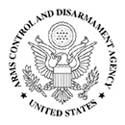 W
WThe U.S. Arms Control and Disarmament Agency (ACDA) was an independent agency of the United States government that existed from 1961 to 1999. Its mission was to strengthen United States national security by "formulating, advocating, negotiating, implementing and verifying effective arms control, nonproliferation, and disarmament policies, strategies, and agreements."
 W
WThe Arms Export Control Act of 1976 gives the President of the United States the authority to control the import and export of defense articles and defense services. The H.R. 13680 legislation was passed by the 94th Congressional session and enacted into law by the 38th President of the United States Gerald R. Ford on June 30, 1976.
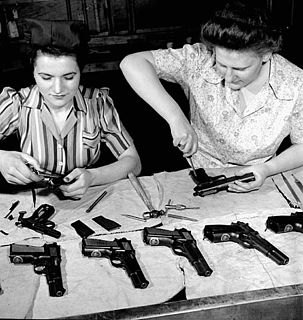 W
WThe arms industry, also known as the arms trade, is a global industry which manufactures and sells weapons and military technology, and is a major component of the military–industrial complex. It consists of a commercial industry involved in the research and development, engineering, production, and servicing of military material, equipment, and facilities. Arms-producing companies, also referred to as arms dealers, or as the military industry, produce arms for the armed forces of states and for civilians. Departments of government also operate in the arms industry, buying and selling weapons, munitions and other military items. An arsenal is a place where arms and ammunition - whether privately or publicly owned - are made, maintained and repaired, stored, or issued, in any combination. Products of the arms industry include guns, artillery, ammunition, missiles, military aircraft, military vehicles, ships, electronic systems, night-vision devices, holographic weapon sights, laser rangefinders, laser sights, hand grenades, landmines and more. The arms industry also provides other logistical and operational support.
 W
WThe Arms Reduction Coalition (ARC) is a United Kingdom-based non-profit non-governmental organisation which campaigns for a reduction in the resources spent on arms and the military and for those resources to be divereted to programmes that benefit humanity and the earth; such as poverty reduction, sustainable development, protecting the vulnerable, systems for peaceful Conflict resolution and maintaining the environment.
 W
WArms trafficking or gunrunning is the illicit trade of contraband small arms and ammunition, which constitutes part of a broad range of illegal activities often associated with transnational criminal organizations. The illegal trade of small arms, unlike other organized crime commodities, is more closely associated with exercising power in communities instead of achieving economic gain. Scholars estimate illegal arms transactions amount to over US$1 billion annually.
 W
WThe Atomic Energy Act of 1946 determined how the United States would control and manage the nuclear technology it had jointly developed with its World War II allies, the United Kingdom and Canada. Most significantly, the Act ruled that nuclear weapon development and nuclear power management would be under civilian, rather than military control, and established the United States Atomic Energy Commission for this purpose.
 W
WThe Atomic Energy Act of 1954, 42 U.S.C. §§ 2011-2021, 2022-2286i, 2296a-2297h-13, is a United States federal law that covers for the development, regulation, and disposal of nuclear materials and facilities in the United States.
 W
WAtomic Weapons Rewards Act of 1955 authorized financial transactions for information pertaining to the unlawful acquisition, importation, or manufacture of special nuclear material into the continental United States. The United States federal statute specifies financial reward payments of fifty thousand dollars be approved by the United States President with an inclusion not to exceed five hundred thousand dollars. The Act of Congress established an Awards Board embodying Federal Directorates from Secretary of the Treasury, Secretary of Defense, Attorney General, Central Intelligence, and Atomic Energy Commission.
 W
WThe Bureau of Arms Control, Verification and Compliance (AVC) is a bureau within the United States Department of State. It is responsible for providing oversight of policy and resources of all matters relating to the verification of compliance, or discovery of noncompliance, with international arms control, nonproliferation, and disarmament agreements.
 W
WThe Bureau of International Security and Nonproliferation (ISN) is a bureau within the United States Department of State responsible for managing a broad range of nonproliferation and counterproliferation functions. The bureau leads U.S. efforts to prevent the spread of weapons of mass destruction and their delivery systems.
 W
WCampaign Against Arms Trade (CAAT) is a UK-based campaigning organisation working towards the abolition of the international arms trade. It was founded in 1974 by a coalition of peace groups. It has been involved in several campaigns, including a high-profile legal challenge against the Serious Fraud Office's decision to suspend a corruption investigation into BAE Systems in 2007. On 27 September 2012, it was honoured with a Right Livelihood Award for its "innovative and effective campaigning".
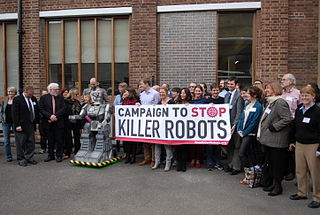 W
WThe Campaign to Stop Killer Robots is a coalition of non-governmental organizations who seek to pre-emptively ban lethal autonomous weapons.
 W
WThe Conference on Disarmament (CD) is a multilateral disarmament forum established by the international community to negotiate arms control and disarmament agreements based at the Palais des Nations in Geneva. The Conference meets annually in three separate sessions in Geneva.
 W
WThe Control Arms Coalition is a campaign jointly run by a coalition of over 100 organisations including Amnesty International, IANSA, Oxfam International and Saferworld.
 W
WDisarmament is the act of reducing, limiting, or abolishing weapons. Disarmament generally refers to a country's military or specific type of weaponry. Disarmament is often taken to mean total elimination of weapons of mass destruction, such as nuclear arms. General and Complete Disarmament was defined by the United Nations General Assembly as the elimination of all WMD, coupled with the “balanced reduction of armed forces and conventional armaments, based on the principle of undiminished security of the parties with a view to promoting or enhancing stability at a lower military level, taking into account the need of all States to protect their security.”
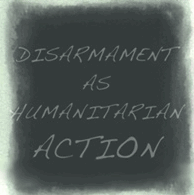 W
WDisarmament as Humanitarian Action: Making Multilateral Negotiations Work (DHA) is a research project carried out at the United Nations Institute for Disarmament Research (UNIDIR). This project, launched in 2004, examines current difficulties for the international community in tackling disarmament and arms control challenges.
 W
WThe Disarmament Insight initiative is a collaboration between UNIDIR's project Disarmament as Humanitarian Action: Making Multilateral Negotiations Work and the Geneva Forum.
 W
WThe Federation of American Scientists (FAS) is an American nonprofit global policy think tank with the stated intent of using science and scientific analysis to attempt to make the world more secure. FAS was founded in 1945 by scientists who worked on the Manhattan Project to develop the first atomic bombs. The Federation of American Scientists also aims to reduce the amount of nuclear weapons that are in use, and prevent nuclear and radiological terrorism. They hope to present high standards for nuclear energy's safety and security, illuminate government secrecy practices, as well as track and eliminate the global illicit trade of conventional, nuclear, biological and chemical weapons. With 100 sponsors, the Federation of American Scientists claims that it promotes a safer and more secure world by developing and advancing solutions to important science and technology security policy problems by educating the public and policy makers, and promoting transparency through research and analysis to maximize impact on policy. FAS projects are organized in three main programs: nuclear security, government secrecy, and biosecurity. FAS played a role in the control of atomic energy and weapons, as well as better international monitoring of atomic activities.
 W
WThe Foreign Military Sales Act of 1968, Pub.L. 90–629, 82 Stat. 1320-2, enacted October 22, 1968, was supplemental legislation to the Arms Control and Disarmament Act of 1961 and the Foreign Assistance Act of 1961. The Act discloses the United States commitment and sustainment to a world free from the dangers of armaments and the scourge of war.
 W
WThe Foreign Military Sales Act of 1971, Pub.L. 91–672, 84 Stat. 2053, enacted January 12, 1971, was created as an amendment to the Foreign Military Sales Act of 1968. The Act of 1971 established declarations to promote international peace and national security for economic, political, and social progress. The declaration provided coordination for international armament appropriations meeting the objectives of the Nixon Administration's foreign policy.
 W
WFormer Soviet Union Demilitarization Act of 1992, 22 U.S.C. ch. 68 §§ 5901-5931, is a United States Federal law created to coordinate disarmament efforts with the former Soviet Union. The Act, better known as the National Defense Authorization Act for Fiscal Year 1993, provided legislative authority for the United States Department of Defense supporting armament retooling, chemical demilitarization, and nonproliferation initiatives.
 W
WThe G8 Global Partnership Against the Spread of Weapons and Materials of Mass Destruction is a security initiative announced at the 2002 G8 summit. It entails a pledge by G8 members to commit US$ 20 billion, over a ten-year period, towards the elimination and security of some weapons of mass destruction (WMDs) in Russia and former soviet states. The agreement was initiated against the backdrop of the September 11 attacks and specifically aimed to deny terrorists access to WMDs. Some of the stated priorities include: destroying stockpiles of chemical weapons, dismantling decommissioned nuclear submarines, safeguarding/disposing fissile material as well as employing former weapons scientists. The initiative was extended in 2011. Now it has 27 members after Hungary joined in December, 2013.
 W
WGlobal Zero is an international non-partisan group of 300 world leaders dedicated to achieving the elimination of nuclear weapons. The initiative, launched in December 2008, promotes a phased withdrawal and verification for the destruction of all devices held by official and unofficial members of the nuclear club. The Global Zero campaign works toward building an international consensus and a sustained global movement of leaders and citizens for the elimination of nuclear weapons.
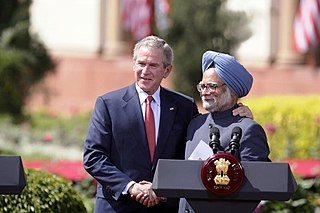 W
WThe 123 Agreement signed between the United States of America and the Republic of India is known as the U.S.–India Civil Nuclear Agreement or Indo-US nuclear deal. The framework for this agreement was a July 18, 2005, joint statement by then Indian Prime Minister Dr.Manmohan Singh and then U.S. President George W. Bush, under which India agreed to separate its civil and military nuclear facilities and to place all its civil nuclear facilities under International Atomic Energy Agency (IAEA) safeguards and, in exchange, the United States agreed to work toward full civil nuclear cooperation with India. This U.S.-India deal took more than three years to come to fruition as it had to go through several complex stages, including amendment of U.S. domestic law, especially the Atomic Energy Act of 1954, a civil-military nuclear Separation Plan in India, an India-IAEA safeguards (inspections) agreement and the grant of an exemption for India by the Nuclear Suppliers Group, an export-control cartel that had been formed mainly in response to India's first nuclear test in 1974. In its final shape, the deal places under permanent safeguards those nuclear facilities that India has identified as "civil" and permits broad civil nuclear cooperation, while excluding the transfer of "sensitive" equipment and technologies, including civil enrichment and reprocessing items even under IAEA safeguards. On August 18, 2008 the IAEA Board of Governors approved, and on February 2, 2009, India signed an India-specific safeguards agreement with the IAEA. After India brought this agreement into force, inspections began in a phased manner on the 35 civilian nuclear installations India has identified in its Separation Plan. The deal is seen as a watershed in U.S.-India relations and introduces a new aspect to international nonproliferation efforts. On August 1, 2008, the IAEA approved the safeguards agreement with India, after which the United States approached the Nuclear Suppliers Group (NSG) to grant a waiver to India to commence civilian nuclear trade. The 48-nation NSG granted the waiver to India on September 6, 2008 allowing it to access civilian nuclear technology and fuel from other countries. The implementation of this waiver made India the only known country with nuclear weapons which is not a party to the Non-Proliferation Treaty (NPT) but is still allowed to carry out nuclear commerce with the rest of the world.
 W
WThe Missile Technology Control Regime (MTCR) is a multilateral export control regime. It is an informal political understanding among 35 member states that seek to limit the proliferation of missiles and missile technology. The regime was formed in 1987 by the G-7 industrialized countries. The MTCR seeks to limit the risks of proliferation of weapons of mass destruction (WMD) by controlling exports of goods and technologies that could make a contribution to delivery systems for such weapons. In this context, the MTCR places particular focus on rockets and unmanned aerial vehicles capable of delivering a payload of at least 500 kg (1,100 lb) to a range of at least 300 km and on equipment, software, and technology for such systems.
 W
WA Multilateral Export Control Regime is an informal group of like-minded supplier countries that seek to contribute to the non-proliferation of weapons of mass destruction, delivery systems, and advanced conventional weapons through national implementation of guidelines and control lists for exports. For a chart of national membership in different regimes, see the SIPRI Yearbook chapter on "Transfer controls".
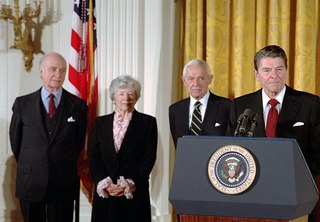 W
WThe Nitze criteria are three basic requirements that encompass the Reagan administration's definition of a successful Ballistic Missile Defense (BMD) deployment. They are named for Paul Nitze, Reagan's chief arms control negotiator, who proposed them in a 1985 speech.
 W
WNuclear disarmament is the act of reducing or eliminating nuclear weapons. It can also be the end state of a nuclear-weapons-free world, in which nuclear weapons are completely eliminated. The term denuclearization is also used to describe the process leading to complete nuclear disarmament.
 W
WNuclear ethics is a cross-disciplinary field of academic and policy-relevant study in which the problems associated with nuclear warfare, nuclear deterrence, nuclear arms control, nuclear disarmament, or nuclear energy are examined through one or more ethical or moral theories or frameworks. In contemporary security studies, the problems of nuclear warfare, deterrence, proliferation, and so forth are often understood strictly in political, strategic, or military terms. In the study of international organizations and law, however, these problems are also understood in legal terms. Nuclear ethics assumes that the very real possibilities of human extinction, mass human destruction, or mass environmental damage which could result from nuclear warfare are deep ethical or moral problems. Specifically, it assumes that the outcomes of human extinction, mass human destruction, or environmental damage count as moral evils. Another area of inquiry concerns future generations and the burden that nuclear waste and pollution imposes on them. Some scholars have concluded that it is therefore morally wrong to act in ways that produce these outcomes, which means it is morally wrong to engage in nuclear warfare.
 W
WNuclear Non-Proliferation Act of 1978, 22 U.S.C. § 3201, is a United States federal law declaring that nuclear explosive devices pose a perilous threat to the security interests of the United States and continued international progress towards world peace and the development of nations.
 W
WAs the collapse of the Soviet Union appeared imminent, the United States and their NATO allies grew concerned of the risk of nuclear weapons held in the Soviet republics falling into enemy hands. The Cooperative Threat Reduction (CTR) Program was an initiative housed within the Defense Threat Reduction Agency (DTRA). The CTR program is better known as the Nunn–Lugar Act based on the Soviet Nuclear Threat Reduction Act of 1991 which was authored and cosponsored by Sens. Sam Nunn (D-GA) and Richard Lugar (R-IN). This Act was created in 1986 in a congressional meeting. According to the CTR website, "the purpose of the CTR Program is to secure and dismantle weapons of mass destruction and their associated infrastructure in former Soviet Union states." An alternative explanation of the program is "to secure and dismantle weapons of mass destruction in states of the former Soviet Union and beyond".
 W
WThe Proliferation Security Initiative (PSI) is a global effort that aims to stop trafficking of weapons of mass destruction (WMD), their delivery systems, and related materials to and from states and non-state actors of proliferation concern. Launched by United States President George W. Bush in May 2003 at a meeting in Kraków, Poland, the PSI has now grown to include the endorsement of 105 nations around the world, including Russia, Canada, the United Kingdom, Australia, France, Germany, Italy, Argentina, Japan, the Netherlands, Poland, Singapore, New Zealand, Republic of Korea and Norway. Despite the support of over half of the Members of the United Nations, a number of countries have expressed opposition to the initiative, including India, China and Indonesia.
 W
WSaferworld is an international non-governmental organisation with conflict prevention and peacebuilding programmes in over 20 countries and territories in the Horn of Africa, the African Great Lakes region, Asia, the Middle East, Central Asia and the Caucasus. It was founded in Bristol, UK in 1989 and now has its main office in London.
 W
WSmall Arms and Light Weapons (SALW) refers in arms control protocols to two main classes of man-portable weapons."Small arms", broadly speaking, are individual-service kinetic projectile firearms. These include: handguns, muskets/rifled muskets, shotguns, rifles, submachine guns/personal defense weapons, squad automatic weapons and light machine guns."Light weapons", broadly speaking, are infantry-portable weapons that are either crew-served kinetic firearms, incendiary devices, or shoot explosive munitions. These include: anti-materiel rifles/anti-tank rifles, general-purpose machine guns/medium machine guns, unmounted heavy machine guns, portable flamethrowers, grenades, rifle grenades/underslung grenade launchers, grenade launchers, automatic grenade launchers, recoilless rifles, rocket-propelled grenades, man-portable anti-tank missiles, man-portable air-defense systems and mortars under 100 millimetres (3.9 in) caliber.
 W
WA firearm is any type of gun designed to be readily carried and used by an individual. The term is legally defined further in different countries.
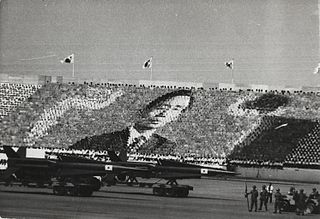 W
WIn 1979, South Korea agreed to ballistic missile guidelines, limiting the country’s ballistic missile development and possession to 180 km in range.
 W
WSoviet Nuclear Threat Reduction Act of 1991, 22 U.S.C. § 2551, was chartered to amend the Arms Export Control Act enacting the transfer of Soviet military armaments and ordnances to NATO marking the conclusion of the Cold War. The Act sanctions the Soviet nuclear arsenal displacement shall be in conjunction with the implementation of the Treaty on Conventional Armed Forces in Europe.
 W
WStockholm International Peace Research Institute (SIPRI) is an international institute based in Stockholm. It was founded in 1966 and provides data, analysis and recommendations for armed conflict, military expenditure and arms trade as well as disarmament and arms control. The research is based on open sources and is directed to decision-makers, researchers, media and the interested public.
Iran convened a conference titled "International Disarmament and Non-proliferation: World Security without Weapons of Mass Destruction" on 17 and 18 April 2010 in Tehran. The theme of the conference was Nuclear Energy for All, Nuclear Weapons for No One.
 W
WA treaty battleship was a battleship built in the 1920s or 1930s under the terms of one of a number of international treaties governing warship construction. Many of these ships played an active role in the Second World War, but few survived long after it.
 W
WUK arms export refers to trades of UK-made weapons around the world. The country is one of the world’s most successful arms exporters. According to the analysis by Action on Armed Violence, Military arms deals have been prepared £39bn between 2008 and 2017.
 W
WThe United Nations Disarmament Commission (UNDC) is a United Nations commission under the United Nations General Assembly which primarily deals with issues relating to Disarmament.
 W
WThe United Nations General Assembly First Committee is one of six main committees at the General Assembly of the United Nations. It deals with disarmament and international security matters.
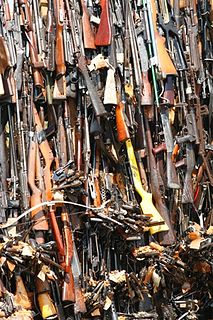 W
WUnited Nations Security Council resolution 1209, adopted unanimously on 19 November 1998, after recalling resolutions 1170 (1998) and 1196 (1998) on Africa, the Council addressed illicit arms flows on the continent.
 W
WThe Conference for the Reduction and Limitation of Armaments of 1932–1934 was a failed effort by member states of the League of Nations, together with the United States, to accomplish disarmament. It took place in the city of Geneva, Switzerland, from 1932 to 1934.